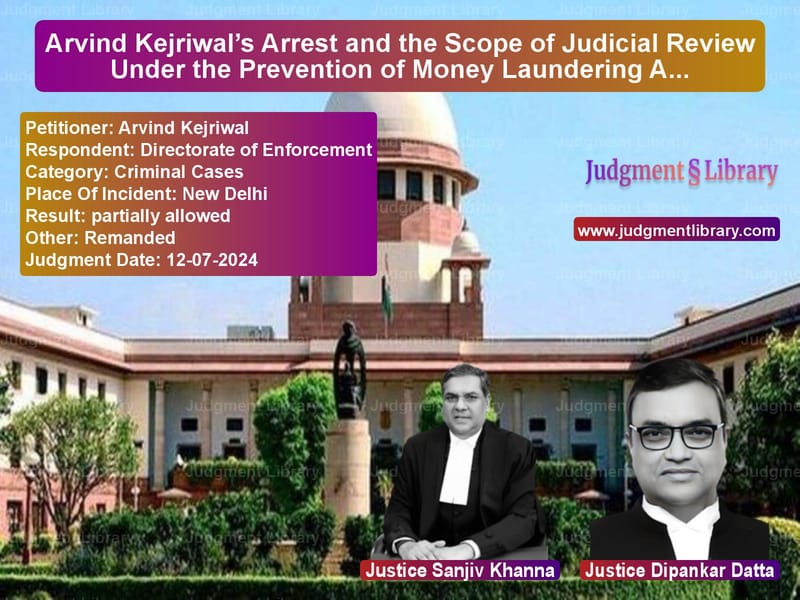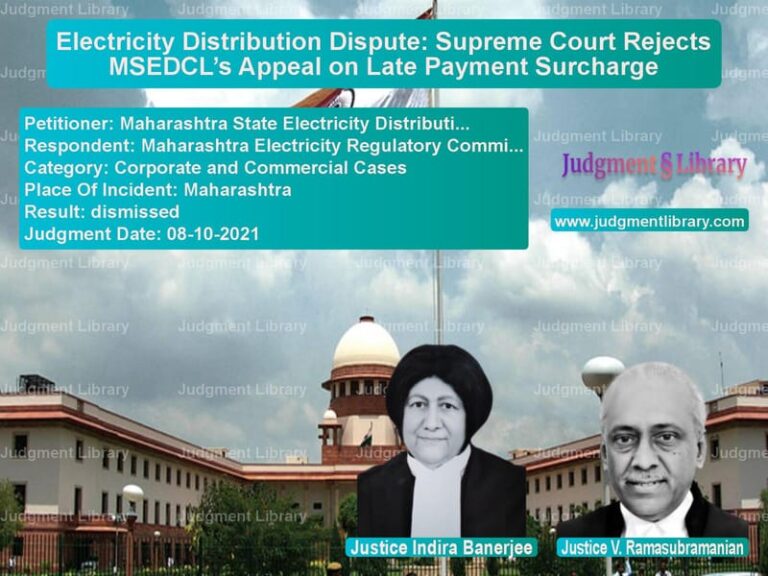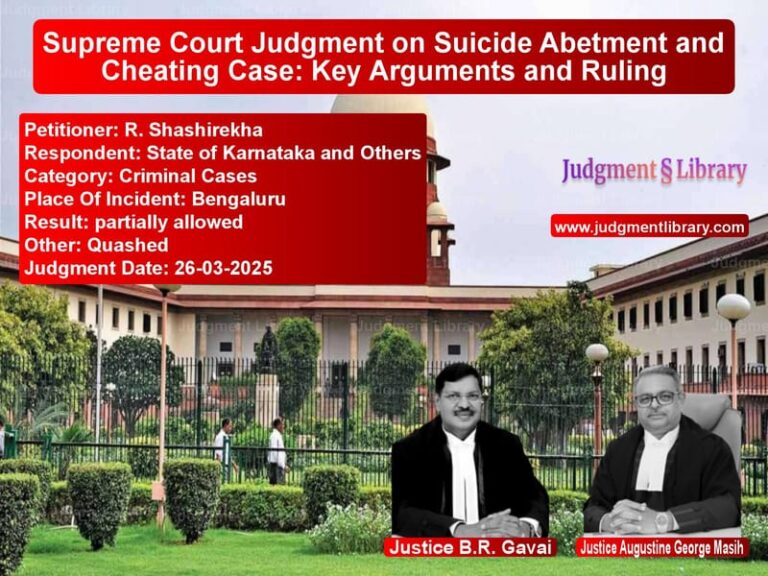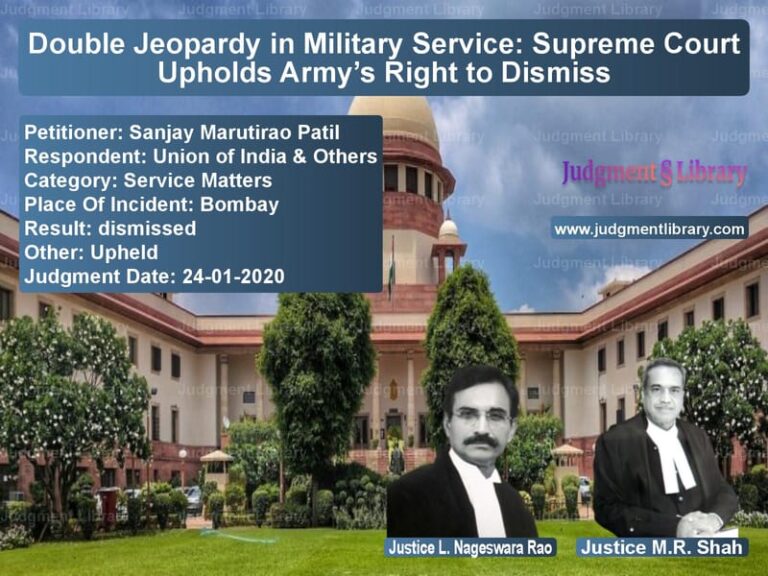Arvind Kejriwal’s Arrest and the Scope of Judicial Review Under the Prevention of Money Laundering Act
The recent judgment in Arvind Kejriwal vs. Directorate of Enforcement raises critical questions about the validity of arrests under Section 19 of the Prevention of Money Laundering Act (PMLA), the necessity of such arrests, and the extent of judicial review. The case revolves around the alleged involvement of Arvind Kejriwal in the Delhi Excise Policy, which was accused of being designed to benefit select liquor manufacturers, wholesalers, and retailers through undue financial gains.
Arvind Kejriwal challenged his arrest, arguing that it violated the conditions stipulated under Section 19(1) of the PMLA. The judgment extensively examined the legality of his arrest and the procedural safeguards meant to protect individuals from arbitrary detention.
Background of the Case
The case originated from an investigation into the Delhi Excise Policy 2021-22, which was alleged to have facilitated cartelization in the liquor industry, leading to undue pecuniary benefits for a select group of businesses. The Central Bureau of Investigation (CBI) registered an RC (Regular Case) based on a complaint by the Lieutenant Governor of Delhi, alleging corruption in the policy’s formulation and implementation.
The Directorate of Enforcement (DoE) subsequently registered an ECIR (Enforcement Case Information Report) based on this predicate offense. The investigation alleged that Arvind Kejriwal, the Chief Minister of Delhi and National Convenor of the Aam Aadmi Party (AAP), played a key role in crafting the policy to benefit certain liquor vendors in exchange for kickbacks, which were then allegedly funneled into the AAP’s election campaigns in Punjab and Goa.
Petitioner’s Arguments
Arvind Kejriwal contended that his arrest was illegal and violated Section 19 of the PMLA, which requires:
- Existence of material evidence to justify arrest.
- Recording of “reasons to believe” in writing.
- Immediate communication of grounds for arrest.
He argued that the DoE selectively relied on statements from co-accused and approvers while ignoring exculpatory evidence. He pointed out that key witnesses, such as P. Sarath Reddy and Raghav Magunta, who initially did not implicate him, changed their statements only after being arrested and later turned approvers.
He further submitted that:
- He was not named in the original chargesheets filed by the CBI.
- The prosecution’s evidence primarily relied on statements that were obtained under duress.
- There was no direct evidence linking him to money laundering.
Respondent’s Arguments
The Directorate of Enforcement countered these claims, asserting that Kejriwal was the key conspirator behind the excise policy. The agency alleged:
- He played an active role in formulating the policy to benefit certain businesses.
- He facilitated kickbacks amounting to Rs. 100 crores.
- Funds obtained from the policy were used for the AAP’s Goa election campaign.
- He failed to respond to nine summons issued under Section 50 of the PMLA.
The DoE argued that judicial review should be limited and that courts should not interfere with ongoing investigations.
Judgment and Key Observations
The Supreme Court held that Section 19(1) of the PMLA imposes strict safeguards against arbitrary arrest. It reaffirmed that:
- The DoE must have “reasons to believe” that a person is guilty before making an arrest.
- The grounds for arrest must be communicated meaningfully.
- The necessity to arrest must be objectively assessed.
The court noted that while Kejriwal’s arrest was backed by material evidence, there were concerns over selective reliance on certain statements and the necessity to arrest him at the given time.
Judicial Review and Need for Arrest
One of the most critical aspects of the judgment was its emphasis on the “necessity to arrest.” The court questioned whether the DoE adequately demonstrated why Kejriwal’s arrest was essential at that stage, given that:
- The investigation had been ongoing since 2022.
- Most evidence was already available before his arrest in March 2024.
- He had not been declared a flight risk.
The court ruled that judicial review extends to assessing whether the power of arrest was exercised lawfully and proportionately. It highlighted that:
- Merely failing to appear before investigators is not sufficient grounds for arrest.
- The DoE must show that arrest was necessary to prevent tampering with evidence or influencing witnesses.
- The principle of proportionality must be considered when restricting personal liberty.
Conclusion
The judgment in Arvind Kejriwal vs. Directorate of Enforcement sets a precedent in evaluating arrests under the PMLA. It underscores that while law enforcement agencies have the power to arrest, this power must be exercised within the framework of statutory safeguards. The ruling affirms that courts have the authority to scrutinize arrests to ensure they are not arbitrary and conform to legal requirements.
The case also sheds light on the broader implications of money laundering laws in political corruption cases, emphasizing the importance of procedural fairness and the rule of law.
Petitioner Name: Arvind Kejriwal.Respondent Name: Directorate of Enforcement.Judgment By: Justice Sanjiv Khanna, Justice Dipankar Datta.Place Of Incident: New Delhi.Judgment Date: 12-07-2024.
Don’t miss out on the full details! Download the complete judgment in PDF format below and gain valuable insights instantly!
Download Judgment: arvind-kejriwal-vs-directorate-of-enfor-supreme-court-of-india-judgment-dated-12-07-2024.pdf
Directly Download Judgment: Directly download this Judgment
See all petitions in Money Laundering Cases
See all petitions in Bail and Anticipatory Bail
See all petitions in Fraud and Forgery
See all petitions in Extortion and Blackmail
See all petitions in Judgment by Sanjiv Khanna
See all petitions in Judgment by Dipankar Datta
See all petitions in partially allowed
See all petitions in Remanded
See all petitions in supreme court of India judgments July 2024
See all petitions in 2024 judgments
See all posts in Criminal Cases Category
See all allowed petitions in Criminal Cases Category
See all Dismissed petitions in Criminal Cases Category
See all partially allowed petitions in Criminal Cases Category







